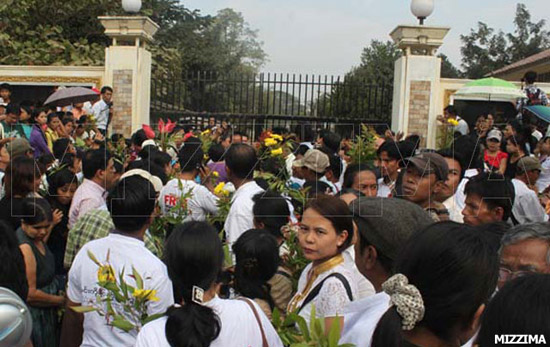Western nations welcomed Burma’s release of political prisoners over the weekend, even as it became clear that the release did not include all the prisoners of conscience held in Burmese jails.

The exact number of freed political prisoners remains elusive, because of Burma’s secretive government. Recently, the National League for Democracy gave the authorities a list of 604 prisoners considered to be political detainees.
Home Minister Lt. Gen. Ko Ko said at a press briefing on Saturday that the government was able to locate 430 people on that list. Of the 430, 302 were freed Friday, he said while 128 remained detained for breaking laws considered strictly criminal or for links with the Taliban, according to The Associated Press.
However, the Assistance Association for Political Prisoners (Burma) in Thailand has said as many as 1,000 political detainees might still be behind bars, mainly because they were convicted under statutes not regarded by the government as political offenses.
Many of the most prominent political prisoners who were serving long sentences were released. U.S. President Barack Obama praised the release as “a substantial step forward for democratic reform,” according to the AP.
U.S. Secretary of State Hillary Rodham Clinton spoke with Myanmar's Foreign Minister Wunna Maung Lwin and Suu Kyi over the weekend to emphasize U.S. support for “the path of reform,” according to a State Department spokesperson. She also announced that the U.S. would name an ambassador to the embassy in Rangoon, after an absence of more than two decades.
The AP said Norway on Saturday rewarded Burma by no longer urging Norwegian companies “to refrain from trade and investment in Burma.” In Oslo, the foreign minister said the recommendation had only a narrow application for Norway, and that the country would continue to follow the E.U.'s sanction regime.
Some human rights activists urged caution in removing Western sanctions.
“Pressure for progress on the remaining prisoners and other human rights concerns in Myanmar must not abate,” said Suzanne Nossel, Amnesty International USA's executive director. “The risk is that the restoration of ties between the two countries may be premature and could weaken the pressure to address critical areas of unfinished business in addressing serious human rights abuses in Myanmar.”
The release of prisoners came ahead of visits by two key U.S. senators influential in foreign affairs, Mitch McConnell and John McCain. McConnell arrives on Monday and will visit with Suu Kyi and government officials.
On Monday, French Minister for Foreign Affairs Alain Juppé ends a two-day visit. He met with Suu Kyi and ethnic opposition leaders on Sunday in Rangoon, and he will meet with President Thein Sein and the speakers of both houses of Parliament in Naypyitaw on Monday, according to Reuters.
“Like the rest of the international community, we have observed with a lot of attention the positive signs given by President Thein Sein,” Juppe said after meeting Suu Kyi at her home.
According to Agence France Presse, he said: “We will respond – France and the EU – positively and in concrete terms to these significant gestures.”
NLD senior leader Win Tin said, “The release of such a large number of political prisoners demonstrates the government's will to solve political problems through political means. This amnesty will ease political tension before the upcoming April by-election.”



